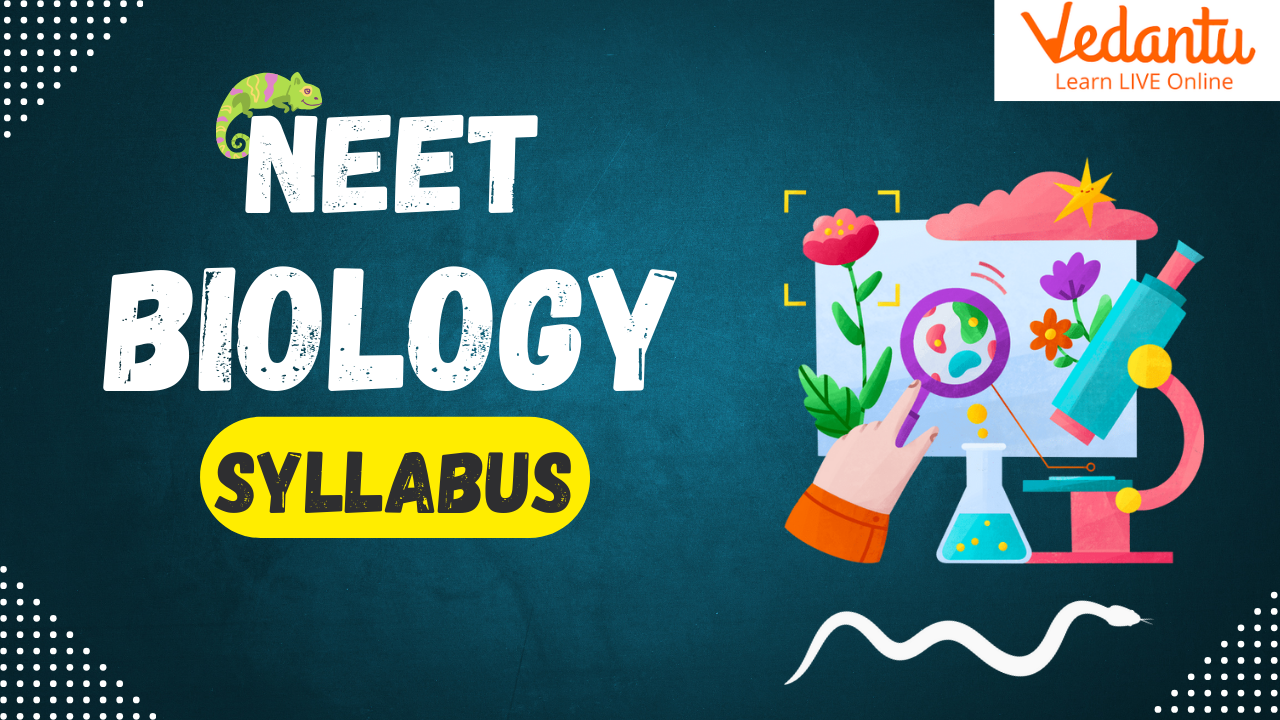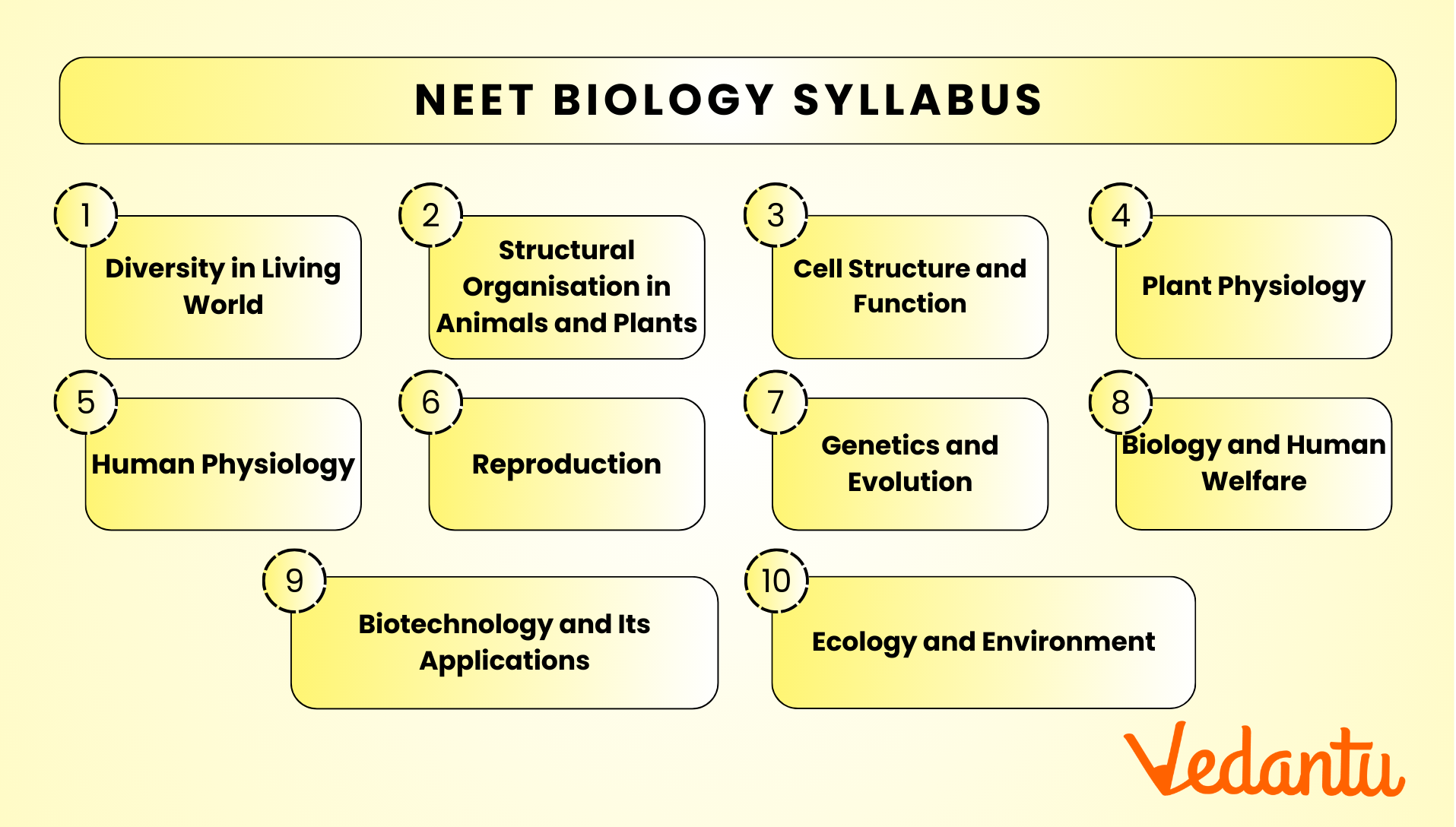NEET 2026 Biology Syllabus for Medical Entrance Examination - FREE PDF Download
FAQs on NEET Biology Syllabus 2026 (Updated)
1. What are the new changes in NEET Biology syllabus 2026?
The NEET Biology syllabus for 2026 may include updates or modifications to existing topics, but significant changes are uncommon. It's essential to refer to the latest official NEET syllabus released by the National Medical Commission (NMC) or the National Testing Agency (NTA) for accurate information or our Vedantu Official Site.
2. What are the tips for scoring maximum marks in the NEET Biology exam by referring to NEET 2026 syllabus Biology?
Maximum questions are asked from this subject; hence biology is considered the most important component of NEET exams. The most important step that should be taken that helps in the preparation for NEET exams is planning. Students should prepare an effective study plan and follow it daily. Also, one wise choice that students can make is to focus mostly on the chapters that contain high weightage. Referring to good books by reputed authors and publications will help the students in scoring good marks as the content available in these books is correct and valid.
3. What are important chapters in the NEET Biology Syllabus 2026?
The most important chapters in the NEET 2026 syllabus Biology section are human physiology, evolution and genetics, and the diversity of living organisms. This information is derived from the weightage of the chapters which is 20%, 18%, and 14%, respectively. Hence, it is advised for the students to focus more on these chapters and get all their doubts cleared in a systematic manner. Vedantu app or website provides you with effectively revised study material which includes reference notes, diagrams, video modules, etc. that will help you ace your exams.
4. How many units are there in the NEET 2026 Biology syllabus?
The NEET 2026 Biology syllabus is divided into 10 units:
Diversity in Living World
Structural Organisation in Animals and Plants
Cell Structure and Function
Plant Physiology
Human Physiology
Reproduction
Genetics and Evolution
Biology and Human Welfare
Biotechnology and Its Applications
Ecology and Environment
5. What is the weightage for each unit in NEET 2026 Biology?
The approximate weightage for each unit in the NEET 2026 Biology exam is as follows:
Diversity in Living World: 10%
Structural Organisation in Animals and Plants: 8%
Cell Structure and Function: 8%
Plant Physiology: 10%
Human Physiology: 12%
Reproduction: 8%
Genetics and Evolution: 12%
Biology and Human Welfare: 8%
Biotechnology and Its Applications: 5%
Ecology and Environment: 10%
6. Are there any deleted topics in the NEET 2026 Biology syllabus?
Yes, some advanced topics have been removed from the NEET 2026 Biology syllabus. This includes some of the detailed concepts in genetics, plant physiology, and ecology. Please refer to the official syllabus for the complete list of deleted topics.
7. What resources should I use to prepare for NEET Biology 2026?
You should primarily rely on the NCERT textbooks for both Class 11 and 12. In addition:
Reference books like Trueman’s Biology, Pradeep’s Biology, and Objective Biology by Dinesh can be used for extra practice.
Test series and mock exams from NEET coaching institutes like Vedantu for timed practise.
8. Can I skip any topic in NEET Biology preparation?
It’s not advisable to skip any topic, as NEET is a highly competitive exam. However, focus more on high-weightage topics and areas where you are weaker, but do not leave out any major concepts, especially from the NCERT syllabus.
9. Is NEET Biology hard to crack?
As compared to physics and chemistry exams, biology exams are the easiest. As biology mostly contains diagrams and theoretical concepts it is considered easy. To learn biology effectively, students should always master the general concepts before tackling the specific ones. Diagrams play an important role in clearing the concepts. The diagrams in biology are each vivid and unique. Hence, they are easy to remember.
10. How important is the Plant Physiology section in NEET Biology?
The Plant Physiology section holds significant importance in NEET Biology. Topics like photosynthesis, respiration, transpiration, and plant growth regulators are frequently tested.
Questions from this unit are typically straightforward and conceptual, so mastering this section can help you score well.


























